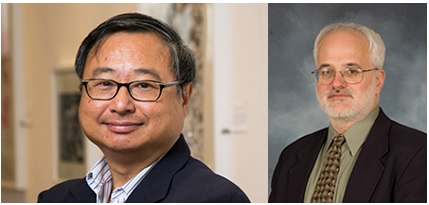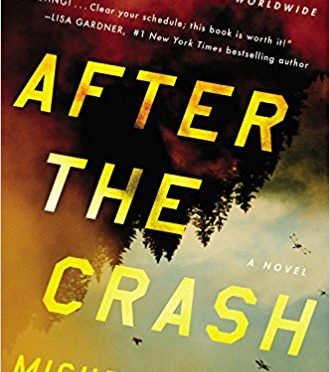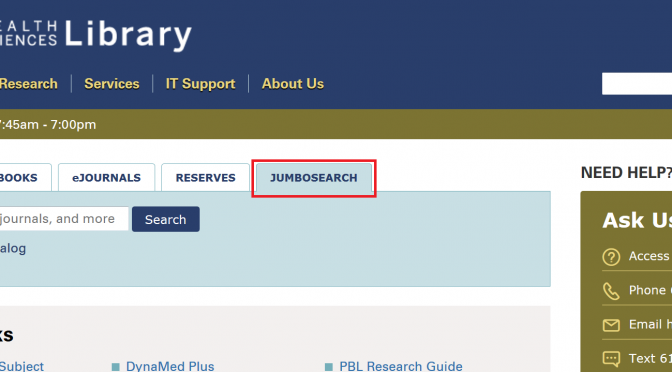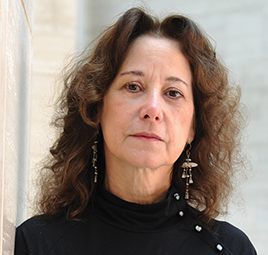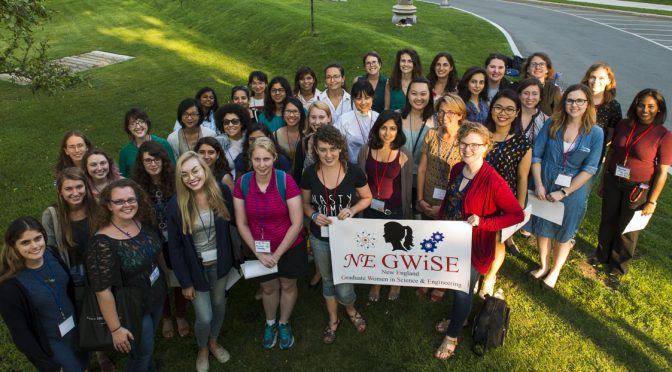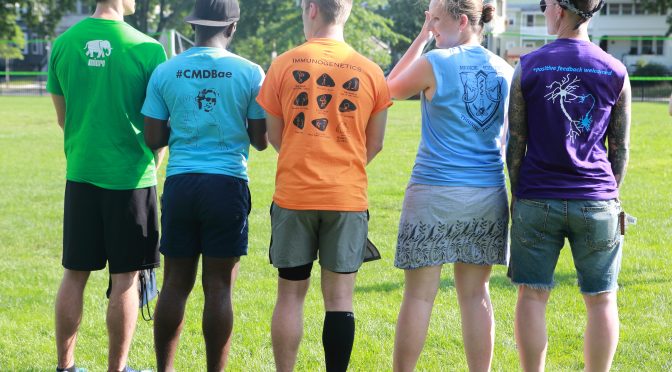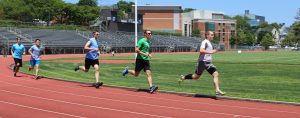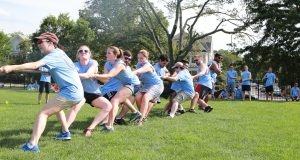The beginning of this academic year has seen a shift in the leadership of the Sackler school with the retirement of both the Dean & the Associate Dean. Dr. Naomi Rosenberg’s decision to retire from her role as the Dean of Sackler after 13 years of dedicated service was received with a mixture of surprise and trepidation, which was compounded by Associate Dean Kathryn Lange’s retirement decision around the same time. The dynamic duo left large shoes to fill and the search committee spent the summer choosing candidates who would have the school and its constituents’ best interests in mind. To that end, Daniel Jay, Ph.D., a faculty member of the Developmental, Chemical & Molecular Biology department, and Daniel Volchok, Ed.D., previously the Assistant Dean for Graduate Student Life at Northeastern University, were chosen to fill the positions of the Dean and Associate Dean, respectively. Both of these individuals bring their extensive experiences to the table. Dean Jay has mentored numerous graduate students and has served as the post-doc officer for the school prior to his appointment as the Dean, and Assoc. Dean Volchok has worked with both undergraduates and graduate students across multiple disciplines that range from medical schools to business schools.
For Dean Jay, a fortuitously timed conference on graduate education solidified his commitment to throw his hat in the ring, while Assoc. Dean Volchok found that beginning his position simultaneously with a new Dean was a wonderful opportunity to build a fresh vision for Sackler from the ground up. Aside from similar serendipitous timing, Jay and Volchok also developed convergent objectives for how to keep Sackler and its associated graduate programs a competitive academic institution. Of particular interest regarding these new goals is that they grew directly out of interactions with students.
“In my interview, with the students I met with, they all talked about career,” Volchok recalled. “It was very important to the students. It turned out they were right…career focus is part of the life here.”
Jay states that their new mission for Sackler is one of “training to career excellence”, which encourages high distinction not only at the bench for students, but also in less traditionally academic contexts, such as in the boardroom or at the news desk. “The reason for that,” Jay explained, “is that 80% of our trainees go on to careers beyond academia…and we need to train all of those individuals in addition to the small number that do go on in academia to compete, to excel, and to lead in areas of whatever their chosen career passion.”
Both Jay and Volchok believe that trainees are the key to Sackler’s success. To highlight the importance of student leadership, Jay mentions that “extracurricular programs, that didn’t exist 10 years ago, were developed by student leadership such as the GSC [Graduate Student Council], TBBC [Tufts Biomedical Business Club] and the PDA [Postdoctoral Association].” They both want to see this trend to continue as they would like students to take ownership of their career choices and approach the Dean’s office with their needs and wants to ensure their success. Jay believes that “we will be stronger and better if we are willing to change with the times to provide what students require for success.” He is also less concerned that faculty may not be on board with non-traditional career choices. He believes that most faculty are not opposed to career choices outside of academia, and he stresses that research excellence is still the first priority for any trainee at the Sackler school and will not be compromised
In his twenty years at Tufts, Jay has watched, as well as aided, the trainee community forge extracurricular programs and initiatives to fulfill these alternative training needs, despite, and more aptly because of, the shortage of accessible resources. To build upon this foundation, this fall semester the Dean’s office launched two new trial initiatives: a drug development short course, taught by alumnus Stefan Gross, and career counseling services provided by Sarah Duncan. In addition, Volchok is currently working on developing a business skills course based on his experience in Northeastern’s business school; such action speaks to the fresh perspectives he brings to Sackler through his extensive and varied educational and administrative experience. While this type of career training will remain supplemental in the short-term, they plan to eventually incorporate such training directly into the infrastructure of Sackler. This integration will run the gamut from admissions to available curriculum, such as proposed course offerings focused on business or transferable skills (eg – team building, project management, etc.), school-facilitated industry internships that are integrated into a student’s research plan, and possibly a two-year biomedical Masters program that would incorporate training in both research and non-traditional science career development.
The majority of these programs will be accessible not just for graduate students but also for Tufts postdocs as well. Jay’s role as the post-doc officer for the school has made him very much aware of the bottleneck effect of the current academic job crisis that these postdocs face. Therefore, he has stressed that programs be made open to the whole Sackler community whenever possible. He also proudly mentions the success of the PDA, which organized around 70 events last year, and affirms his faith in trainee leaders to build career-related programs. Unfortunately, industry internships will not be open to postdocs, but Jay hopes to work with industry contacts to improve that situation.
The success of these programs and the new vision, according to Jay, will be evaluated by whether “graduates have an easier time finding their first job.” He mentions that he developed this milestone after his conversations with alumni who wished they had learned particular skills before entering the job market. In these conversations, he also discussed building more formal engagement between the alumni and the school, such as the possibility of alumni acting as adjunct professors to teach aforementioned short courses and the development of a biomedical research interest group. He affirms that he has had a positive reaction from the alumni who have also expressed interest in hosting/organizing events. He also mentions that alumni would definitely be a part of the new branding strategy now that the Dean’s office has developed its new mission. As a key component to executing these varied goals, Jay and Volchok have also established and seeded a new Sackler career development fund, dedicated to financing the programming to come out of this new mission.
Jay and Volchok aim to use their first year to launch programs that would serve as “trial balloons.” The school is “small, so [it is] easy to make changes”, according to latter, and therefore, they would like to test out which programs can be expanded upon in the long term. “This year will test the viability and utility of these short courses that can be used to build upon for longer term goals, and student engagement and participation will be crucial to seeing these initiatives succeed,” Jay elaborated. This last point seems to be critical to the new administration, as “feet on the ground”, as Jay put it, will be the litmus test for whether these initiatives continue. Both seemed confident that the students will indeed engage, given how proactive the trainee community has been about this topic in the past, and are ready and willing to listen to individual feedback.
“We’re of the size that we can make sure students are successful,” Volchok observed. “We can work with individual students when we need to. Students can feel like part of the community and not just a number.”
While a small student body has organizational advantages and new approaches can be tested easily without much bureaucratic repercussions, there are also disadvantages. The current funding climate, along with the fact that Sackler is surrounded by heavyweight schools with similar programs, has led to a dwindling number of students recruited to our programs every year. In the light of such events, concerns regarding the continuity of Sackler as a successful graduate school are bound to rise. However, both Jay and Volchok believe that their new mission of a strong emphasis on career development will help Sackler stand out amongst the other schools in the area.
“I view this as our route to success…how do we define ourselves in a very competitive environment,” Jay said. “If we dedicate ourselves wholeheartedly to this mission, we would, in some ways, distinguish ourselves so that we are competitive, so that a student may choose us because they seek this path toward career excellence. We have to find a way to be relevant…I think the combination of being in Boston, of being small and mobile–if we can do it, we set the standard for the rest of the country. So that is exciting to me, and that’s making a difference, and this is why I’ve taken this job.”
Besides the strong emphasis on career development, the Dean’s office’s new mission also prioritizes community building both in and outside of Tufts. Jay mentions a great advantage that Sackler has by being surrounded by Medical, Dental and Nutrition schools, and being in the same university as a Veterinary school–all opening doors to an influx of opportunities for trainees and faculty to design their studies that could result in more collaboration within the school. As an example, he cites the Clinical & Translational Science Institute (CTSI) and their intentions of working more with the Sackler Basic Science programs (CTSI currently offers drop-in hours for statistics consultation and also offers a course on biostats, both of which are open to Sackler trainees). Jay is also looking forward to hearing individual programs’ changes to curriculum based on discussions between students and faculty mentors (CMDB is offering a bioinformatics class to its students after it was brought up in the program retreat). Additionally, Jay hopes to reach out to industry as well for more collaboration on various fronts.
Jay and Volchok are also tuned in to the social needs of the community to protect its members while reaching outside of their bubble. They are both advocates of the new student club Scientists Promoting Inclusive Excellence @ Sackler (SPINES), and stressed “increased awareness of diversity and inclusion” and building a tolerant community. In an effort to increase student engagement, Volchok has revised The Goods–a weekly digest of news, opportunities and events both on and off campus–delivered to the school community. He believes that “students have a good voice here” and are great resources on how the school and its environment can be improved. Both Jay and Volchok mentioned the need for more community outreach into middle schools, both in the Chinatown communities and the African-American communities in Roxbury. They would like the students to help with organizing and mentoring in these communities.
Of course, most of these ideas are still in the very early stages. “We’re at the very beginning of all this,” Jay said with a laugh. Even so, they seem to be off to a good start, as Jay and Volchok spent their first few weeks listening to the needs of the community before shaping their mission. Jay admits “…the level of concern and frustration of career path thing is here,” an issue frequently brought up by students in the past. Jay and Volchok are committed to listening to the needs of the trainees and helping them as much they can, but they also want the students to take ownership of their own career paths by being proactive. When asked what the students can do to help the Dean’s office, Volchok expresses his eagerness to work with students to improve their experience at Sackler. “Be open and honest with us. Come and tell us when things are going well. Come and tell us when things are not going well. If you have ideas and things we can do differently, let us know.”

